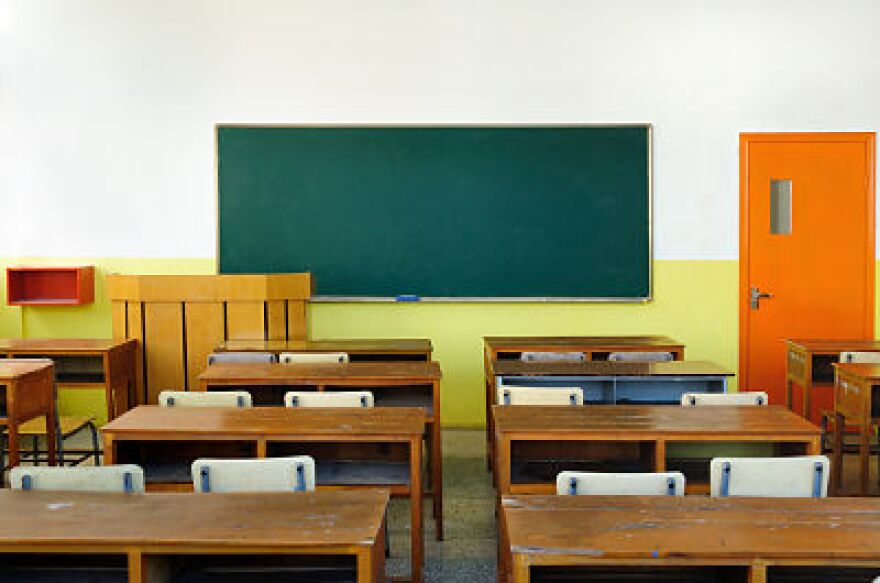Remember the water cycle?
It's typically first learned in elementary school, around third grade. You know, precipitation, evaporation, condensation? Many readers may remember filling out a graphic organizer to help them memorize the steps. Others may recall having to answer a question about the water cycle on a standardized test.
It's likely fewer of us did what the third graders at Liberty' EPiC Elementary did last year. They studied the ongoing water crisis in California, blogged about it. Then, once they realized how bad the situation was, came up with the idea of making clay pots to sell them in order to donate the money to water.org.
Dr. Michelle Schmitz, the principal at EPiC, says the experience pushed the kids' empathy.
"We focus on real-world problems. We want to go into the community and solve problems. And we provide choice for them all the time."
But she also says the work EPiC students do is not lacking rigor.
"We follow the same standards everyone else [in Missouri] has. We teach reading, writing, math but we just embed them in these projects," she says.
Schmitz admits the approach is not traditional but after its first year in 2015, EPiC was outperforming most other Missouri schools on the most traditional of academic measures: standardized tests.
Asking, 'What if?'
EPiC is a by-application public school within the Liberty district. Superintendent Jeremy Tucker says Liberty schools are, on average, high-performing but there was still a desire by teachers and parents to do something more.
"It's about moving away from a 'one size fits all' approach. We want to be learner-centered, tap into students' passions and interests," he says.
Too often, he suggests, traditional school models don't allow for that type of freedom. As proof, that this was not such a far-flung idea, Tucker says for the start of EPiC's first academic year in 2015, it got more than 1,000 applications for 300 slots.
"It started with the question, 'What if?' We had to challenge our thinking about the structure of our schools, re-imagine what schools look like."
'More restrictions than inmates'
Tucker could have written the jacket blurb of Nikhil Goyal's new book.
Goyal, at first, may strike some as an odd spokesperson for re-imagining schools. After all, at a mere 20 years of age, he's a published author who made the Forbes 30 Under 30 list in 2013. If there's anyone who has been well-served by America's hide-bound school system, you may think, it's him.
But Goyal says he hated school. In fact, he compares his own and many other students' experience in school to being in a prison.
"The restrictions put on kids, even in high-achieving schools," he says, "are two times the restrictions put on inmates. Children have very little freedom and control and that has devastating effects on how they see themselves as learners."
Goyal has just published Schools On Trial: How Freedom and Creativity Can Fix Our Educational Malpractice. It is the result of Goyal's observations at schools around America he says have the potential to "change the landscape of education" in this country.
Places like the Tinkering School in California, which (as its name suggests) prioritizes kids working with real tools to solve problems. Or the Brooklyn Free School in New York, which holds weekly school meetings in which students discuss their problems with how the school is functioning.
Though they may have different approaches and philosophies, all of the schools Goyal uses as examples focus on so-called "student-centered instruction," the type of learning EPiC says it tries to promote.
"A fundamental tenet of progressive education is that children should have autonomy," Goyal says. "Evidence suggests when children have more control over their learning experience, they are more likely to learn more effectively, have greater self-determination, and gain real-life skills needed as an adult--things like collaboration, critical thinking, active problem-solving."
Testing has made things worse
Yet, this type of philosophy is the exception and not the rule in modern schools. Goyal points to a test-driven education culture that prioritizes results over process, correct answers over critical thinking, as the primary culprit.
"When you have so much pressure and emphasis on testing, schools are forced away from these creative, innovative practices. The structures we see in schools — classrooms, desks in rows, bells — those have been around since the 1850s," Goyal says.
At EPiC, principal Schmitz does not feel beholden to those structures. And in fact, her school's favorable scores in its first years indicate to her that EPiC's student-centered approach is working.
"They're moving around, going places, being engaged. We perform really well on our state tests because they are engaged," she says.
Liberty is already a high-performing district, and EPiC's wait list for applications indicates families and students are motivated by the model. Goyal says "experiments" like EPiC should not be confined to a smaller, more privilege subset of American children.
"I have pushed policymakers to try pilot programs in districts to study [these models] and see the effects of these innovative approaches. The evidence shows in these schools, compared to regular public schools, they have lower dropout rates and higher student engagement."
A former teacher, Kyle Palmer is KCUR's morning newscaster and reporter. You can follow him on Twitter @kcurkyle.





